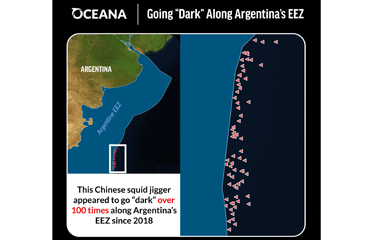Foreign fishing fleets, mostly Chinese, are “pillaging” the waters off the coast of Argentina and are disappearing from public tracking systems, likely hiding illegal, unreported, and unregulated (IUU) fishing activity, according to the latest publication from marine sustainability non-governmental organization Oceana.
The NGO analyzed data from 1 January, 2018, to 25 April, 2021, collected by Global Fishing Watch (GFW), an independent nonprofit founded by Oceana in partnership with Google and SkyTruth, which collects tracking data from the automatic identification system (AIS) carried onboard fishing vessels. Oceana documented more than 800 foreign vessels logging over 900,000 total hours of apparent fishing, of which 69 percent was conducted by more than 400 Chinese vessels. Another 26 percent of the fishing activity was conducted by Korean, Spanish, and Taiwanese fleets, with nearly 200 vessels fishing for some 251,000 hours. Less than 1 percent of the total amount, or 9,269 hours of visible fishing, was actually conducted by 145 of Argentina’s fishing vessels.
More than two-thirds of the vessels and over half of all the fishing (575,294 hours) can be attributed to squid-jiggers, while trawlers accounted for most of the remaining fishing (255,455 hours). The distant-water fleets mainly fish for shortfin squid, a species vital to Argentina’s fishing economy and central to the diets of numerous commercial and recreational species, including tuna and swordfish.
Within the analysis, Oceana also documented more than 6,000 “gap events,” or occasions where AIS transmissions did not broadcast for more than 24 hours, permitting fishing vessels to hide their locations and mask potentially illegal behavior. Chinese ships made up 66 percent of the total 600,000 hours logged in gap events. Fifty-six percent of the ships that appeared to have AIS gaps engaged in at-sea transshipments, whereby fishing vessels transfer their catch to refrigerated cargo vessels, according to Oceana. This practice is considered a weak link in the seafood supply chain, as it means illegally caught fish could potentially be mixed with legal catch.
Oceana pointed to a case registered in April 2020, when about 100 mostly Chinese-flagged squid jiggers were allegedly caught fishing illegally in Argentina’s national waters with their public tracking devices turned off, eventually leading to one of numerous recent interactions between the Argentine Coast Guard and suspected illegal fishing vessels that have escalated into violence.
“Our oceans need protection, not reckless fishing from China and other distant-water fleets," Marla Valentine, Oceana’s illegal fishing and transparency campaign manager, said in a release. “Fishing at this scale, under the radar, and without regard for laws and sustainability can have detrimental impacts on entire ecosystems, as well as the people and economies that depend on them. This is just one example of how unregulated distant-water fishing fleets can take advantage of a lack of transparency and enforcement at sea. It has become increasingly clear that Chinese commercial fishing interests are far-reaching and have no boundaries; The world cannot afford to ignore the massive impacts of fleets like this on our oceans.”
Valentine called for the constant use of AIS devices on all fishing vessels to guarantee transparency at sea and traceability in the seafood supply chain.
Oceana’s deputy vice president of U.S. campaigns, Beth Lowell, pointed to a recent study that found the United States imported an estimated USD 2.4 billion (EUR 2 billion) in seafood derived from IUU fishing in 2019.
“The United States can take action to address IUU fishing by requiring that all seafood imports have catch documentation to demonstrate it was legally caught, implementing full-chain traceability, and making transparency a condition of import,” she said, calling on all governments to take action in ensuring that all seafood is safe, legally caught, responsibly sourced, and honestly labeled.
In March, a leaked document originating from the Office of Intelligence and Analysis – part of the U.S. Department of Homeland Security – recommended the creation of a multilateral coalition with South American nations led by the U.S. to challenge China's IUU fishing and trade practices.
Illegal fishing constitutes the sixth-most lucrative criminal endeavor globally, with estimated annual revenues of USD 15 billion to USD 36 billion (EUR 12.3 billion to EUR 29.6 billion), according to a 2017 report by Global Financial Integrity. The Chinese fishing fleet – estimated at 15,000 vessels by the Overseas Development Institute – is by far the largest in the world, and China is the country with the worst rating for contribution to global illegal fishing in a 2019 Global Initiative report.
Beijing has reportedly made distant-water fishing a geopolitical priority, employing state-subsidized private Chinese fishing fleets as a means to extend its power to distant areas around the globe. That power was felt off the waters of South America in July 2020, when a fleet of around 300 mostly Chinese-flagged ships began fishing near the exclusive economic zone around Ecuador’s Galapagos Marine Reserve, one of the world’s richest fishing areas and a hotbed of natural life. For several months, the fleet continued to fish in the seas around South America, affecting countries including Peru, Chile, and Argentina.
According to data from Oceana, Argentina's coastline boasts a tremendous abundance and diversity of marine life, including more than 330 types of finfish, nearly 120 deep-sea species, and a variety of invertebrates. The country’s commercial fishing industry generates USD 2.7 billion (EUR 2.2 billion) in economic impact and makes up 3.4 percent of its gross domestic product. The industry is driven by four species that account for 75 percent of the country’s total catch: shortfin squid, hake, red shrimp, and grenadier.
Shortfin squid is the second-largest squid fishery in the world by volume, and half of the world's catch comes from Argentina. Each year, the shortfin squid fishery generates an average of USD 597 million (EUR 489 million) for South America's economy and up to USD 2.4 billion (EUR 2 billion) in particularly favorable years.
Image courtesy of Oceana







